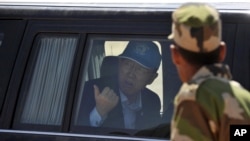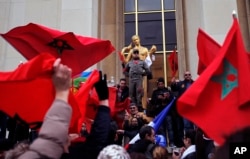Morocco's foreign minister says the government's decision to reduce the number of United Nations staff at the Western Sahara mission is "irreversible."
The Moroccan government and the U.N. have been at odds since Secretary-General Ban Ki Moon visited a camp in Algeria housing refugees from Western Sahara and used the term "occupation" in reference to their plight. Thousands of people demonstrated against the U.N. across Morocco in response last week, carrying banners like "Ban Ki-moon threatens the U.N. process," denouncing Ban's "lack of neutrality" on the issue.
Then, the Moroccan government asked about 55 personnel from the U.N. peacekeeping mission known as MINURSO to leave the country. U.N. officials have asked for the Security Council to act because of the “potential for escalation" into renewed conflict in that region.
On Thursday, Reuters reported that Morocco's foreign minister said the troop drawdown request remains, but the country also remains committed to U.N. military cooperation to guarantee the cease-fire.
Region Still Calm
Deputy Spokesman for Ban, Farhan Haq says a small number of international civilian staff is still in Laayoune (the main city in Western Sahara) including the mission head and about 240 military observers.
Haq says it’s a good thing the situation is calm at the moment but “if the mission is impaired from doing its work, it can’t fulfill all the functions it needs to do to prevent hostilities from resuming,” so there is always a threat hanging overhead, he expressed.
He says Ban stands by everything he says and while he’s not backing away from what he said, he also has explained the use of the word “occupation.” That he used it as a response to emotions he felt when he was talking about people whose lives have been uprooted for so many years.
Haq points out the status of the disputed area is something that ultimately needs to be determined by the territory’s Sahrawi people themselves and it’s the reason why the U.N. mission is in place not just to prevent any flare up of conflict but to put in a process so one can determine the status of Western Sahara once for all.
Settlement Stalled Since 1991
The U.N. has been trying to broker a Western Sahara settlement since 1991 after a cease-fire was reached in a war between Rabat and the Polisario Front that broke out when Morocco deployed its military in the former Spanish territory in 1975. The Polisario Front which claims the territory belongs to ethnic Sahrawis says that a referendum on the future of Western Sahara holds the key to peace and stability in North Africa.
"There will be no peace or stability in the region so long as the Sahrawi people are denied the right to self-determination," Mohamed Salem Ould Salek, a leader of the pro-independence group, told a news conference in the Algerian capital last week.
But Morocco considers the area as part of its kingdom and insists its sovereignty cannot be challenged. In a statement released last week, the Moroccan government said Ban's use of the word "occupation" to describe the status of Western Sahara was "an insult."
Refugees
As a result of the long-standing conflict, tens of thousands of Western Sahara refugees still live in camps in south-west Algeria.
"We want them to give us our independence. Enough suffering and homelessness, we have been suffering for 46 years,” expressed a Sahrawi refugee at the Smara camp near Tindouf in southwest Algeria.
Another one said "we expect Ban Ki-moon's visit to help review the case and solve it peacefully so Morocco understand that this land is not its land but ours, otherwise we will go back and take up arms.”
Occupation or Not
Professor Emeritus of Islamic History in the School of Foreign Service at Georgetown University John Voll says these latest developments have only emphasized that the current situation remains deadlocked.
Voll says the underlying reality is that Morocco has the military force to maintain control while the Polisario Front has real diplomatic support. So the combination of the Polisario inability to have a military victory and Morocco’s inability to have diplomatic victory emphasizes the old divisions.
He says Ban’s visit to Western Sahara was part of his responsibility as the Secretary-General in terms of looking at U.N. operations but he says the use of the term “occupation” was a poor diplomatic choice. Voll also says Ban might have use the word deliberately to push the issue forward. He says the Moroccan response was predictable and expelling U.N. staff is not going to bring an end to MINURSO.





